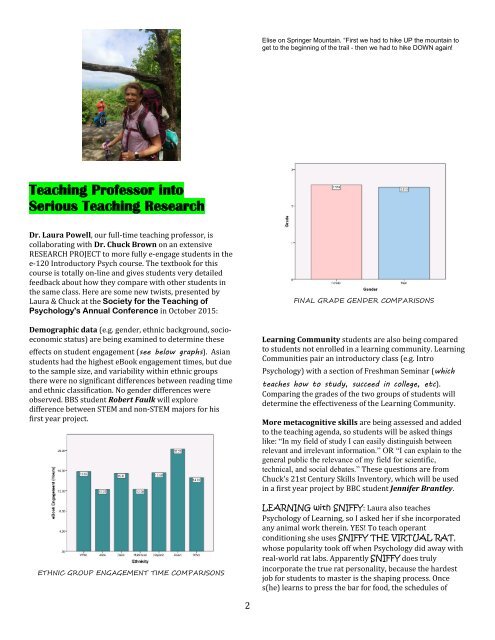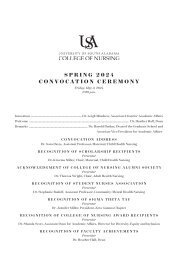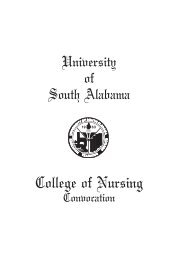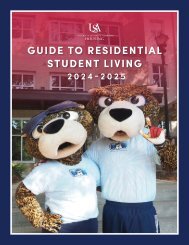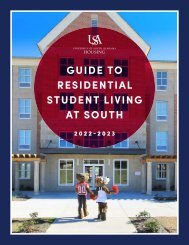Psychology Department Newsletter USA Winter 2016
You also want an ePaper? Increase the reach of your titles
YUMPU automatically turns print PDFs into web optimized ePapers that Google loves.
Elise on Springer Mountain. “First we had to hike UP the mountain to<br />
get to the beginning of the trail - then we had to hike DOWN again!<br />
Teaching Professor into<br />
Serious Teaching Research<br />
Dr. Laura Powell, our full-time teaching professor, is<br />
collaborating with Dr. Chuck Brown on an extensive<br />
RESEARCH PROJECT to more fully e-engage students in the<br />
e-120 Introductory Psych course. The textbook for this<br />
course is totally on-line and gives students very detailed<br />
feedback about how they compare with other students in<br />
the same class. Here are some new twists, presented by<br />
Laura & Chuck at the Society for the Teaching of<br />
<strong>Psychology</strong>'s Annual Conference in October 2015:<br />
Demographic data (e.g. gender, ethnic background, socioeconomic<br />
status) are being examined to determine these<br />
effects on student engagement (see below graphs). Asian<br />
students had the highest eBook engagement times, but due<br />
to the sample size, and variability within ethnic groups<br />
there were no significant differences between reading time<br />
and ethnic classification. No gender differences were<br />
observed. BBS student Robert Faulk will explore<br />
difference between STEM and non-STEM majors for his<br />
first year project.<br />
ETHNIC GROUP ENGAGEMENT TIME COMPARISONS<br />
FINAL GRADE GENDER COMPARISONS<br />
Learning Community students are also being compared<br />
to students not enrolled in a learning community. Learning<br />
Communities pair an introductory class (e.g. Intro<br />
<strong>Psychology</strong>) with a section of Freshman Seminar (which<br />
teaches how to study, succeed in college, etc).<br />
Comparing the grades of the two groups of students will<br />
determine the effectiveness of the Learning Community.<br />
More metacognitive skills are being assessed and added<br />
to the teaching agenda, so students will be asked things<br />
like: “In my field of study I can easily distinguish between<br />
relevant and irrelevant information.” OR “I can explain to the<br />
general public the relevance of my field for scientific,<br />
technical, and social debates.” These questions are from<br />
Chuck's 21st Century Skills Inventory, which will be used<br />
in a first year project by BBC student Jennifer Brantley.<br />
LEARNING with SNIFFY: Laura also teaches<br />
<strong>Psychology</strong> of Learning, so I asked her if she incorporated<br />
any animal work therein. YES! To teach operant<br />
conditioning she uses SNIFFY THE VIRTUAL RAT,<br />
whose popularity took off when <strong>Psychology</strong> did away with<br />
real-world rat labs. Apparently SNIFFY does truly<br />
incorporate the true rat personality, because the hardest<br />
job for students to master is the shaping process. Once<br />
s(he) learns to press the bar for food, the schedules of<br />
2


